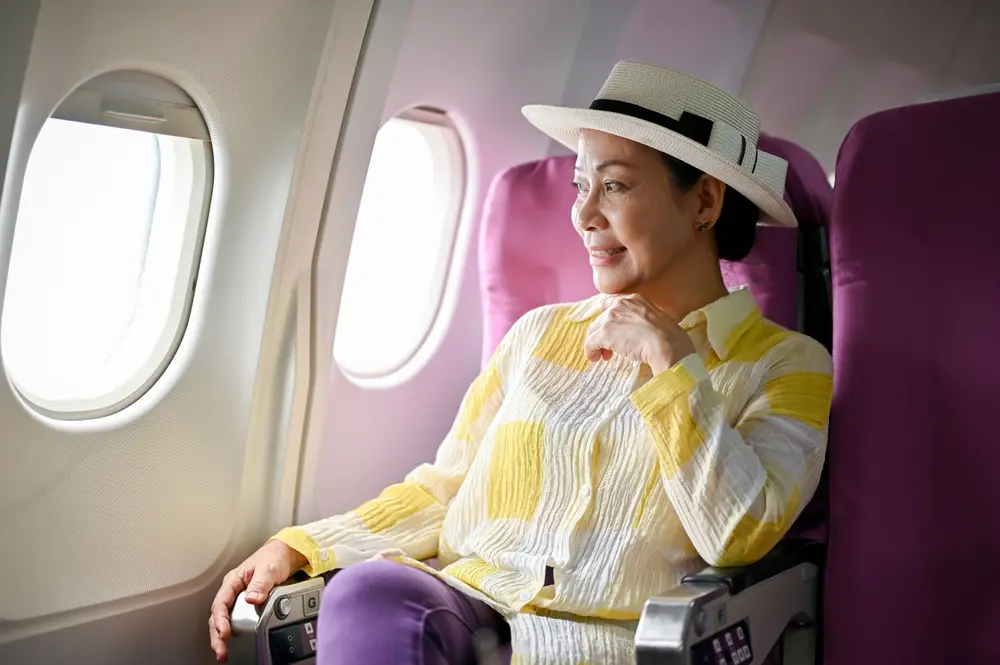If you’re an older traveller or have a medical condition, the idea of a long journey might seem daunting. However, with a bit of planning, your flight can be comfortable and enjoyable.
From wearing compression socks to planning your meals, our 8 expert tips will help you to relax on even the longest journey.

1. Pick the best seat for you
Selecting the right place to sit can significantly enhance your travel experience. If you need to stretch or move around frequently, an aisle seat is ideal, offering easy access to the bathroom. If you prefer to sleep, opt for a spot by the window, which provides a wall to lean against and fewer disturbances.
Research your airline’s seat configurations in advance. Websites like SeatGuru offer detailed maps, helping you find the best seats, such as those with extra legroom or near exits.
Consider the cabin class when booking. While economy seats are budget-friendly, premium economy or business class offers more space and amenities for a comfortable long distance flight.
2. Stay hydrated
Staying hydrated is essential during any flight. Cabin air is dry, so bring an empty water bottle through security and fill it before boarding. Aim to drink at least one litre of water every four hours. Avoid alcohol and caffeine, as they can dehydrate you.
In addition to drinking plenty of water, use a hydrating facial mist or moisturiser to prevent your skin from drying out. Lip balm and eye drops are also helpful. Staying hydrated combats fatigue and keeps you refreshed.
3. Wearing compression socks
Compression socks can be beneficial, especially for older travellers or those with medical conditions. They improve blood circulation, reducing the risk of clots and swelling.
These socks apply gentle pressure, aiding veins and muscles in moving blood more efficiently. They are particularly useful if you have a history of deep vein thrombosis (DVT) or other circulatory issues.
4. Move around frequently
To avoid stiffness and improve circulation, move around the cabin every couple of hours. Simple exercises like ankle circles, calf raises, and seated stretches can help and also reduce the chances of clots forming.
Low-impact exercises you can do in your seat let you move without disturbing others. Regular movement is essential on long flights.
5. Pack comfort essentials
Bring a neck pillow, cosy blanket, and noise-cancelling headphones in your hand luggage to create a peaceful environment for better sleep. Packing an eye mask to block light can help too.
Don’t forget your favourite snacks, as those available on the plane may not suit your taste or dietary needs.
Pack a small toiletry kit with essentials like toothpaste, a toothbrush, and facial wipes. Freshening up mid-flight will make you feel much better.
6. Plan your meals
Choose light, easily digestible meals before boarding. High-fibre foods like fruits, vegetables, and whole grains are best.
While in the air, stay away from heavy, greasy foods that can cause indigestion. Opt for meals with lean protein, complex carbs, and healthy fats to maintain stable energy levels.
7. Dress comfortably
Wear loose, breathable fabrics like cotton. Layering is key as cabin temperatures fluctuate. A light jacket or sweater will help you adjust as needed.
Wear slip-on shoes for easy removal during security checks and added comfort during travel. Avoid tight clothing or accessories that restrict movement or circulation.
8. How to manage jet lag
Jet lag can be challenging, especially for older travellers. If you can, gradually adjust your sleep schedule to your destination’s time zone a few days before your trip. On the plane, set your watch to the new time and follow it as closely as possible.
Stay hydrated and avoid alcohol and caffeine, as they disrupt sleep. Short naps help, but sleeping too long is a bad idea if you’re arriving in the afternoon or evening.
After landing, spend time in natural sunlight to regulate your internal clock. Gentle exercise and staying hydrated will let you adjust to the new time zone more quickly.
Long-haul holidays are rewarding, and with the right preparation, the flight doesn’t have to be a hurdle. Follow these expert tips to enjoy a comfortable journey.

